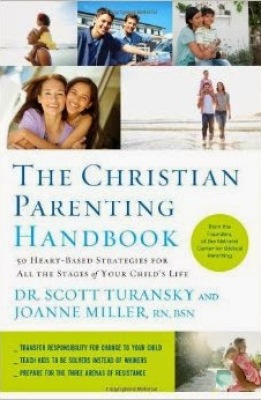Every spring my college girlfriends and I get away to some remote lake house or home to spend a few days together. Invariably, the conversation revolves around our kids and parenting. Last Spring, gathered around Cammi’s kitchen island, we were stumped with an issue regarding some of our young teens. My friend Aimee grabbed her copy of The Christian Parenting Handbook from her duffel and plopped it down on the island.
“It’s not the catchiest title,” she said, “but man, it’s good information.”
I love hearing stories about Aimee and Ben with their three girls. Their home bursts with truth, laughter and fun. So for her to recommend a parenting book, I was all over it.
What I love about The Christian Parenting Handbook:
– The subtitle: “50 Heart-based Strategies for All the Stages of Your Child’s Life.”
This book is a marriage of heart training put into practical application – for every age.
– Easy to read. 50 chapters, 4-5 pages each.
It reads smoothly, but also operates like a reference book. I underlined and starred so much, I just keep on my nightstand. When I don’t know what to do in a situation, I scan through the chapter headings (or all that I previously underlined and summarized) for advice. Easy to look up chapters that address a particular situation.
– Practical. Each chapter offers a suggestion (“Envision a Positive Future,” ch 7) or solution to a problem (“Teach Kids to be Solvers instead of Whiners,” ch 37), then outlines a brief Biblical framework of that suggestion or problem, and then gives examples of practically working out the suggestions.
– For parents of all stages. No matter if your kids are two or twenty. “One of the many benefits of a heart-based approach to parenting is that you can start it at any age,” pg 204. And really, this is more than a parenting book, it’s a relating book. Many of these strategies apply to all relationships – parents, spouses, friends, not just our kiddos.
– Encouraging. The overall tone of Turansky and Miller’s writing is a pat on the back to keep going. I felt validated, challenged, and encouraged throughout the chapters.
For example, “Good Character Qualities Misused (ch 49).“ Oh my word. I have been so encouraged by this chapter:
“All children have good character qualities that when taken to the extreme, have a negative side… As you look at your children’s weaknesses, look for a positive character quality they may be misusing.Then search for ways to balance it…”
The authors continue, “Identifying positive qualities misused will not only encourage you as a parent, but it will help you develop a strategy for training.”
And, “No character strength can be used as an excuse for a corresponding weakness. We must help our children grow and make improvements in areas that are a challenge, but if we tie those weaknesses to corresponding strengths, we may be able to bring about change more quickly.”
Another of the chapters that’s affected me the most is, “The Difference between Tasks, Problems, and Conflicts” (ch 16). It’s like a direct transfusion of wisdom to keep me from spiraling down into frustration or simply feeling sorry for myself.
Simply put (my summary):
Tasks – Normal things we do each day, things that have to be done (making breakfast, training children. Not problems, just things we must do).
Problems – Obstacles that get in the way of your goals (your son didn’t do his homework, daughter can’t find her other shoe).
Million-dollar question – Are you going to move problems down to tasks, or escalate them to conflict?
Important rule: Don’t turn problems into conflict. Instead look for ways to turn problems into additional tasks by developing a plan to solve them and keeping your emotions in check.
Last August, on the night before the first day of school, I made giant attempts to have my kids fed, clean, clothes and backpacks set out, and ready for bed at an early bedtime. At 8:30 pm, as I was shooing the girls upstairs and winding things down, the boys decided they must go with Corbin to WalMart (!) for a couple of very specific school supplies that had escaped my careful, extensive shopping (seriously – WalMart – the night before school starts?!). I presented my arguments as to why it was not a good idea, why the boys needed to settle their minds for rest instead of shopping the narrow, crowded, messy aisles of the superstore. I was trumped by all three men who stood taller than me, and who felt far less concerned with getting a reasonable amount of sleep. Corbin shushed my concerns as if I were an overbearing mother. Me?!
Off they went.
So an hour and a half later, when I got the call that their car battery was dead, and could I come jump the car and pick them up… at that moment, I decidedly put this “problem” into tasks rather than into conflict. Especially when I pulled up to WalMart to see Corbin bent over the hood of his car, while Bran and Hud walked across the parking lot from Wendy’s slurping down giant chocolate shakes.
Moving to task rather than conflict. Was it easy? No. Was it second nature? Absolutely not. But did we get home without further incident or injury or a super angry momma? Yes yes yes.
The lack of sleep that night made much less of an impact than the potential of my escalated anger and frustration. If the boys felt tired Monday morning, it wasn’t my problem. They’d have to work that out. And they did.
To this day, no one (other than me) remembers the night-before-school incident that could have been scarring for three Wilson males – and fortunately, I’m not nursing regrets.
Some other of my favorite chapters: (note – everything in italics = my thoughts)
ch. 2 – Build Internal Motivation (!!!!!)
ch. 9 – Make Parenting Shifts – Parenting well feels like a moving target. Good parents are always learning and growing. As our children move into a new developmental stage, we must make a parenting shift as well.
ch. 15 – Teach Kids to Add Energy to Family Life – Teaching kids to honor their family – to honor means to treat people as special, do more than what’s expected, to have a good attitude.
ch. 19 – Affirm Approximately Right Behavior. Whaat? We have the freedom to do that?? Our kids don’t have to always act completely right? Whew!
ch. 38 – Children Need to Learn How to Work Hard. But what if we don’t live on a farm, and my kids are in school 8 hours a day, even longer with sports? Do they still need to learn how to work hard? YES. But tell me how…
ch. 41 – Use Creativity to Teach Your Children Spiritual Truths
ch. 46 – Privilege and Responsibility Go Together
ch. 47 – Firmness Doesn’t Require Harshness
ch. 50 – The value of Grandparents. Amen. And notice it’s not titled the value of perfect grandparents.
The authors conclude the book by reminding us, “It’s never too late to influence your children. Keep praying, and enjoy the hope God gives to us all. He’s in the business of changing people.”
Amen. And Amen.
Enjoy!


